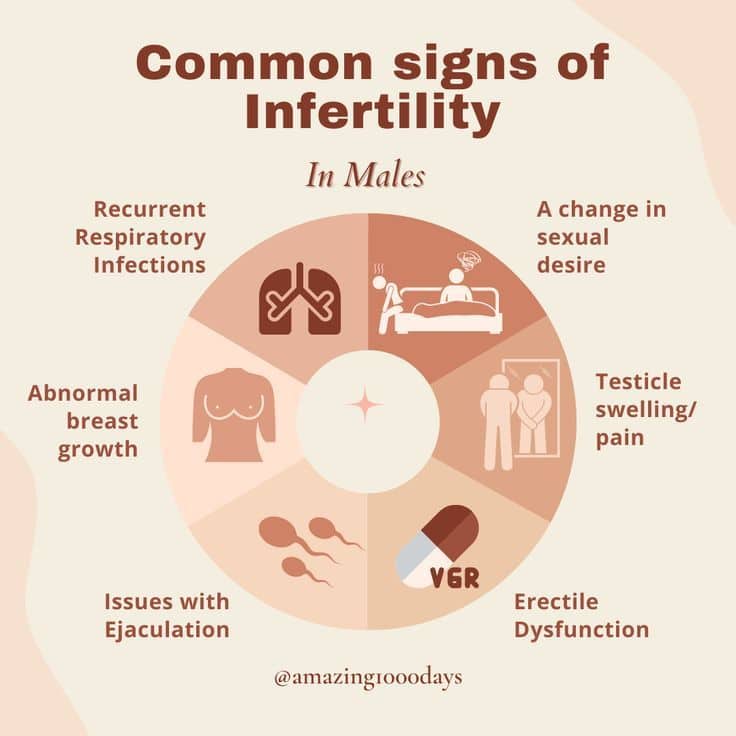Understanding the Signs of Infertility in Men: A Compassionate Guide for Parents
Hey, wonderful parents! Are you and your partner excited about adding a little bundle of joy to your life, but find things aren’t going as planned? It’s quite common to immediately wonder if there’s an issue, and often, the spotlight shines on both partners equally. It’s essential to remember that fertility is a two-person tango, with male infertility accounting for about one-third of all cases. So here’s a warm hug in the form of knowledge, as we explore the signs of male infertility and what to look out for.
Why Understanding Male Infertility Matters?
Embracing parenthood is a dream for many, but when challenges arise, it can be a whirlwind of emotions. Understanding male infertility signs is crucial in taking proactive steps toward finding solutions. Sometimes the signs are subtle, but being aware can empower you with knowledge and choices. Let’s dive into what you should keep an eye on to support the man in your life on this journey.
Common Signs of Infertility in Men
1. Changes in Sexual Desire
A man’s libido, often influenced by hormone levels, can sometimes hint at fertility health. If he’s experiencing a sudden change in sexual desire, it might be time to have a chat with your healthcare provider.
2. Difficulty with Erection and Ejaculation
Erectile dysfunction (ED) or challenges with ejaculation can be stressful and not just for bedroom activities. These issues can also affect the ability to conceive and might signal underlying health problems that contribute to infertility.
3. Testicular Pain or Swelling
Discomfort, pain, or swelling in the testicles isn’t normal and can be symptoms of conditions that may affect fertility. While a variety of issues can lead to these symptoms, it’s vital to rule out any that may impact the ability to father a child.
4. Small, Firm Testicles
The size and firmness of the testicles can influence sperm production. Smaller or firmer-than-normal testicles could indicate potential issues with sperm production, warranting further investigation.
Less Obvious Signs of Male Infertility
1. Changes in Hair Growth
A difference in hair growth patterns or sudden hair loss can be a sign of hormonal changes that could be associated with fertility issues.
2. Pain, Lump, or Swelling in the Groin
A hernia or a varicocele can develop in the groin area, which could potentially impact sperm production or quality, and a physical examination could help pinpoint the issue.
3. Recurrent Respiratory Infections
While it might seem unrelated, recurrent respiratory infections can be a symptom of a rare genetic condition called Cystic Fibrosis, which can affect male fertility.
4. Decreased Testicle Volume and Sperm Count
Often detected through a semen analysis, a decrease in sperm count or testicle volume can be a more direct indication of fertility issues.
Factors That Contribute to Male Infertility
In addition to recognizing the signs, understanding the factors that can contribute to male infertility is equally essential. Issues like hormonal imbalances, past surgeries, environmental factors, lifestyle choices, and other health concerns like obesity or diabetes can play a role.
Next Steps for Concerned Parents
If you’ve observed any of the signs mentioned above or have a gut feeling that something’s amiss, encourage your partner to visit a healthcare provider. It’s better to address these concerns sooner rather than later, as a timeline is quite pivotal in the world of fertility.
Keep in mind that infertility is a sensitive topic and approaching your partner with care and understanding is key. Together, you can explore the issue and decide on the best course of action which may include lifestyle changes, medications, surgeries, or assisted reproductive technologies like IVF.
Remember, parents, you’re not alone in this. With one in eight couples experiencing fertility issues, there’s a supportive community and advanced medical help at your disposal. Stay informed, stay hopeful, and take that step towards understanding and addressing male infertility with strength and love.
Getting to grips with infertility can be daunting, but knowledge is a powerful ally. Stay tuned as we continue to delve deeper into this important topic, because a little patience and a lot of heart can move mountains. And who knows, before long, you might just hear the cheerful giggle of a little one filling your home.

As parents anticipating the joy of raising a child, understanding the nuances of fertility is crucial. The journey of parenthood can sometimes start with its own set of challenges, where recognizing signs of possible infertility in men becomes pivotal. Let’s delve into five key areas you should be aware of to prepare for and address any signs of male infertility with wisdom and grace.
5 Things Parents Should Know in Preparing for Signs of Infertility in Men
1. Familiarize Yourself With Male Reproductive Health
This journey starts with education. Knowing how the male reproductive system works can help you spot when something might be off. Learning about sperm production, hormonal regulation, and the physical attributes of a healthy male reproductive system puts you a step ahead in identifying potential issues.
2. Understand the Role of Lifestyle in Fertility
The impact of lifestyle on fertility can’t be overstated. Factors like nutrition, exercise, stress levels, and exposure to harmful substances all play roles in a man’s reproductive health. A proactive approach to a healthy lifestyle can be a preventative measure and also an important step if you’re facing fertility issues.
3. Know When to Seek Professional Help
Time is of the essence when it comes to fertility. Recognizing the signs of possible infertility early and seeking the advice of a healthcare professional can make a significant difference. It’s recommended to consult a doctor if you haven’t conceived after a year of regular, unprotected intercourse, or sooner if there are known concerns.
4. Be Ready for Emotional Support and Open Communication
Encountering fertility issues can be an emotional rollercoaster for both partners. It’s imperative to maintain open communication lines and support each other. Be ready to listen, offer comfort, and seek counseling if necessary, to navigate through this time together.
5. Explore Fertility Testing and Treatment Options
There are numerous paths to parenthood, and being open to exploring them is key. From semen analyses and hormone testing to exploring assisted reproductive technologies, know what options are available should you need them. Discuss these with your healthcare provider, and consider the emotional and financial implications of each one.
Male infertility can be influenced by various factors – it’s a complex puzzle where each piece plays a significant role. By being informed, supportive, and proactive, you can address this challenge head-on. Your journey to parenthood, though possibly unexpected in its path, is still paved with hope and possibilities. Remember, many couples have walked this road and have found solutions that have brought them the joy of a child. You’re in good company, and with every step, you’re moving closer to your dream of expanding your family.
This guide is the beginning of a broader conversation and a path toward resolution. Stay engaged, stay hopeful, and may your partnership grow stronger as you journey together towards the beautiful destination of parenthood. Embrace your path with love, and let every learning moment along the way be a stepping stone to success in creating your family.
See more great Things to Do with Kids in New Zealand here. For more information see here
Disclaimer
The articles available via our website provide general information only and we strongly urge readers to exercise caution and conduct their own thorough research and fact-checking. The information presented should not be taken as absolute truth, and, to the maximum extent permitted by law, we will not be held liable for any inaccuracies or errors in the content. It is essential for individuals to independently verify and validate the information before making any decisions or taking any actions based on the articles.




